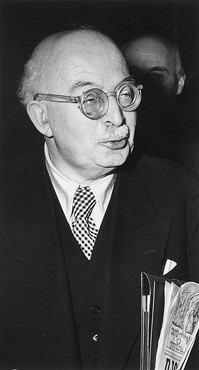
Arnold Zweig
In 1933, Nazi students at more than 30 German universities pillaged libraries in search of books they considered to be "un-German." Among the literary and political writings they threw into the flames were the works of Arnold Zweig.
Excerpt
But the Jews exist, 14 million, reduced only by war and its consequences--Jews who in historical times were a people with a language, a homeland, ethos, creation, and a God, and whose indisputable descendents live everywhere today with a seemingly average disposition, with a history lacking holes, with a tradition, with a will to live their own lives, and with masses whose will to be their own people never loses its self-reliance....
—Caliban, Arnold Zweig, 1927
Which of Arnold Zweig's Works were Burned?
All works published before May 1933
Who was Arnold Zweig?
German novelist and playwright Arnold Zweig (1887-1968) published his first volume of stories in 1911 while he was still a student. Zweig volunteered for the German army in 1915, and spent more than a year at the front. After his war experiences, he became a pacifist. His subsequent writing attacked Prussian militarism. Translated into more than a dozen languages, his prize-winning 1927 novel The Case of Sergeant Grischa tells the story of a Russian prisoner of war's poor treatment by the Germans during World War I. Zweig became a Jewish nationalist and for a time edited a Berlin Zionist periodical. Zweig also co-authored a book with Lion Feuchtwanger, another writer targeted by the Nazis. After Hitler's rise to power, Arnold Zweig was denounced as a pacifist and his books were burned. He sought refuge in Palestine, but ultimately returned to Communist East Berlin where he lived until his death.
Critical Thinking Questions
How did the German public react to the book burnings? What was reaction like outside of Germany?
Why do oppressive regimes promote or support censorship and book burning? Why might this be a warning sign for mass atrocity?

